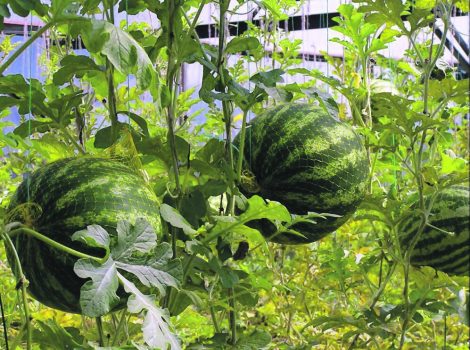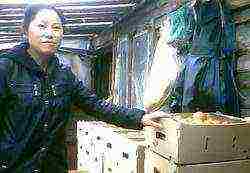
Ural residents who buy fresh vegetables in large retail chains do not even suspect how they risk Arseny Vaganov
“They dirtied all the surrounding forests with their polyethylene, it is very thick, they bring it with them from China and then do not dispose of it,” says Pavel Suroveshkin, head of the Solnechny Bunny farm, outraged. - They work almost always only at night. They are hiding. "
Farmer Suroveshkin agrees to show us the Chinese land. The entire Beloyarsk district is filled with their pale pink greenhouses, he says: “Natural occupation. It would be fine if something useful was produced. So after all, their tasteless tomatoes are impossible to eat. Chemistry is one. After them, there is a dead, poisoned earth. "
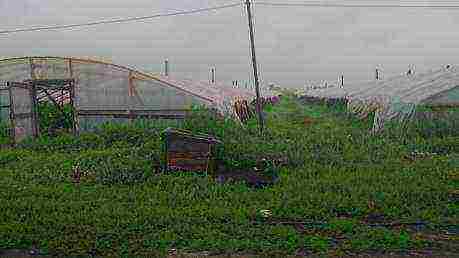
Chinese greenhouses, standing along the road near the village of Khramtsovo, leave their vaults somewhere far beyond the horizon. Locals are sure that these lands were leased to the Chinese by the deputy of the Legislative Assembly of the Sverdlovsk Region Ilya Gaffner, but he refuses.


Not a soul around. We calmly go inside the greenhouse, examine the green tomatoes. Eyewitnesses say they mature in a day, thanks to unknown growth accelerators that foreign "farmers" bring from China.
“These are not fairy tales, I saw this with my own eyes when I was in practice in England in Barnham,” a familiar graduate of the agricultural academy named Alexander will later confirm. “At the Erick Wall farm we were given a special liquid in a cup, we put on rubber gloves and rubbed a twig with a bunch of green tomatoes on it, they were red in the morning.”
Chemicals, by the way, are found nearby in a barn. Bags, barrels, cans of unknown pink liquid. It is impossible to understand what this is, the inscriptions are made in Chinese (and by law everything should be in Russian).
Suddenly a Chinese woman appeared out of nowhere. He waves his hands, making it clear that photographing is not allowed here, takes us from one shed to another, shows us the tomatoes. I washed one, gave it a try. It tastes like fresh oak turnip. We can hardly understand what she says: pink at 25 rubles per kilogram, red - 30, and their owner left for Yekaterinburg.
When asked who is the owner, he is silent. Not a word more in Russian. She got scared, poured a whole bag of vegetables and refused to take money. Given the fact that the Chinese have millions in profits from these greenhouses, this is not surprising.
Only around Khramtsovo, according to local residents, the Chinese have set up greenhouses on about 30 hectares and planted vegetables in the open field on another 100 hectares. And then there is Chernobrovka, Zlatogorovo, Maramzino and so on. At the same time, they do not pay taxes, they do not use expensive certified fertilizers, they save on electricity. In one place, for example, they were powered by the railway, installed a transformer between Zlatogorovo and Loginovo.
“Who gave them to do it, how, for what money - I don't know. But I know for sure that someone is covering them very well, ”says Vyacheslav Vorobyov, chief engineer of ZAO AIC Belorechensky, and looks at the photographs of canisters with chemistry that we made on Chinese plantations. - It's definitely either fertilizers or poisons. Not certified, but their incomprehensible, Chinese. Specially trained people work in our farm with certified chemicals. The technology is followed, agronomists calculate the pesticide load. Then we take the products to the laboratory and receive a certificate of conformity. And the Chinese, of course, do nothing of this. And it is not surprising that they move us with cabbage, with potatoes. "

“This is complete connivance! - Vorobyov is indignant. - I don’t want to speak badly about our state. But they cheat us to the fullest, and this lads who poison us live well "
Tomatoes sprinkled with unknown poisons and treated with growth accelerators grow tasteless, watery, with hard white veins. Even the Rosselkhoznadzor, if it really wants to, will not know what is inside. The fact is that the specialists of the chemical and toxicological laboratory of the veterinary and phytosanitary supervision service have only certain markers that can detect only 5-6 drugs allowed in Russia.
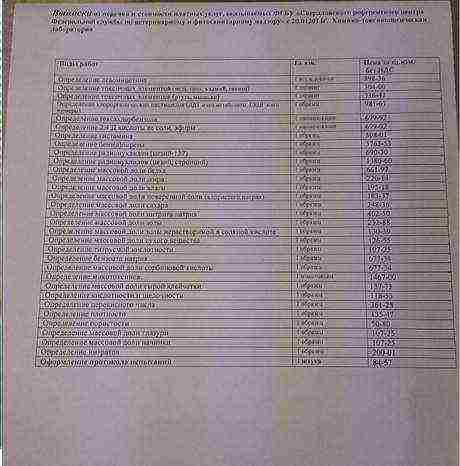
The price list from the chemical and toxicological laboratory of the Rosselkhoznadzor surprises with the prices for services. The most popular study - the identification of organochlorine pesticides - costs almost 1,000 rubles
“Let's say we bought vegetables and decided to check them. They will immediately tell us - write what to check for. How do we know? Well, let's check for nitrates, for pesticide residues, and that's it! We do not know the chemical with which they process the soil, water the plants. And not a single SES will reveal anything. And they have such chemistry that even the grass then does not grow in the place where the greenhouse stood. Nobody knows what will fall off over time, "says Irina Nadezhdina, deputy director of Belorechensky for implementation, and adds that the problem is that Chinese farmers do not officially exist, and Rospotrebnadzor does not check those who do not have legal organization.
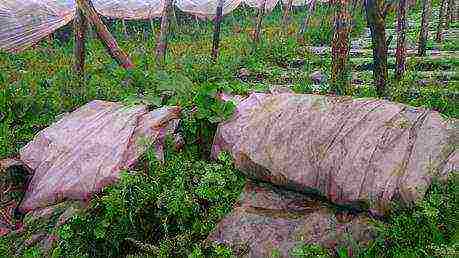
Unlike Rospotrebnadzor, Rosselkhoznadzor, tax police, FMS and other services, vegetable dealers know where to find Chinese farmers. We also found them, sitting on the tail of a Gazelle with Perm license plates. We arrived at the outskirts of the village of Chernobrovka.
A small Chinese boy was playing in the courtyard of the shabby house. A man ran out to meet us and immediately held out his cell phone. At the other end of the pipe, a Chinese woman, quite tolerably speaking Russian, introduced herself as Katya. We asked if it was possible to buy from her a large batch of cucumbers and tomatoes, five hundred kilograms. "No problem! Cucumbers - 15 rubles, tomatoes - 20 rubles, - answered Katya. - Call the day before before you arrive to pick up. Cash payment, give the money to the man you see in front of you. "
The worst thing is that all these Chinese vegetables poisoned with chemicals end up not only in numerous vegetable stalls in Yekaterinburg, neighboring cities and even regions, but also on the shelves of large retail chains. Although they are famous for serious control over suppliers and products, they are powerless against some tricks.

The scheme for getting poison into the network is simple - a certain individual entrepreneur, for example, Pupkin buys a batch of excellent greenhouse vegetables from a village grandmother or a farmer, after which he takes them for analysis, receives a certificate of conformity, calls himself an agricultural producer, goes to the Chinese, buys vegetables from them for 20 rubles and, under this certificate, donates to the network for 50 rubles. This loophole can be closed only with the help of regular spot checks by Rospotrebnadzor and Rosselkhoznadzor.
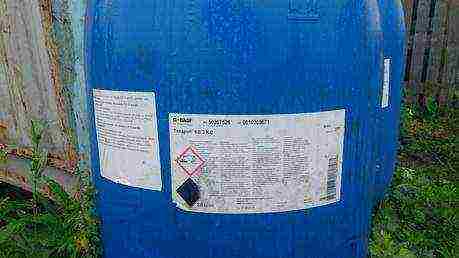
The Rosselkhoznadzor could not get an operative comment. The department was not eager to talk about Chinese vegetables and offered to make an appointment with the head next week. In the Ministry of Agriculture of the Sverdlovsk Region, we received a formal reply. In response to the question of how many greenhouses are maintained by the citizens of the PRC, what volume of products they produce and where it goes, as well as how many vegetables are consumed per year by residents of the region, officials cited extensive statistical data.

“In 2013, agricultural producers of the region, including the population, produced 4.3 thousand tons of vegetable products on an area of 73.1 hectares of spring greenhouses and insulated soil,” says an official letter from the Menselkhoz. “The ministry does not keep records of the consumption of vegetable products by residents of the region, including those grown under film.”
But the law prohibits Rosselkhoznadzor from interfering
Vegetables from the Middle Kingdom flooded the Russian markets in the same way as Chinese consumer goods.This is not an import - the Asians grow tons of tomatoes, cucumbers and cabbage on our farmland. Express technologies, prohibited fertilizers and agrochemicals are used everywhere, so giant tomatoes ripen twice as fast in greenhouses as they are described in textbooks on plant growing. The experts of the Rosselkhoznadzor are well aware of the fact that Chinese "gifts of nature" cause irreversible diseases. But they have no right to interfere!
There are land leased by foreigners in all regions of Russia. Even the migration service does not know how many Chinese farmers work on the once abandoned farmland. Residents of the Ural village of Razmangulovo in the Sverdlovsk Region are retreating under the pressure of Chinese guest workers. Villagers are literally being pushed out of their homes. When strangers appeared in the village, no one seemed to mind. Everyone was even delighted with the greenhouse they built. Then there were more than 50 greenhouses. They suspected that something was wrong when they began to bring in tons of "chemistry" to the village. There are Chinese characters on the bags, and the aliens themselves hide information behind a language barrier, like behind the Great Wall of China. In the heat, the locals do not open their windows, because the pungent smell hurts their eyes. The fish disappeared in the river, and the cattle grazing in the neighboring meadow began to die. No one has ever tried to figure out what kind of chemicals are flowing into the river as a yellow slurry.
Phantom people
During the war, on the outskirts of Volgograd, they fought to death for every piece of land. Now farmland is given to foreigners by hectares. The new Russian peasants, the Chinese, are phantom people. Most of them are not officially registered anywhere, while on Russian soil they feel like masters.
There is no sanitary and prosecutorial supervision here, and Asians do not pay taxes. But the harvest is rich. Kilometer greenhouses are covered with plastic wrap, it remains after harvesting: plowing the land with tractors, the newcomers bury cellophane in the soil for centuries. For six years of labor, Volgograd guest workers changed several plots of land that were already unusable due to pesticides and cheap saltpeter that saturated the soil.
Residents of the Tasheba station in Khakassia wrote a collective complaint to the Russian government, no longer hoping that local surveillance would put an end to the Chinese bacchanalia. Where there used to be real black soil, now there is rubbish. On the bank of a local river, another secret of vegetable abundance is hidden in the bushes - a mechanical pump that rattles all over the area. The hope and support of Chinese land reclamation delivers water to the greenhouses, and the former river, in which children used to swim, has turned into a swamp, dozens of plastic waste bags and whole rolls of cellophane are buried there. The land is privately owned and leased to the Chinese. The inspectors issued formidable orders, but this does not work. The only way out is through the court to oblige the landlord to terminate the contract with the Chinese and free their hectares from greenhouses. However, only local authorities have the right to file a claim. But they seemed to be blind.
Enemies of Russia?
In Russia, it is allowed to use only those substances that are listed in the official register of pesticides and pesticides. Until recently, the regulations for their use were monitored by the Rosselkhoznadzor, not allowing up to 20 thousand tons of hazardous products on the market per year. In imported, including Chinese, cucumber tomatoes, they found an increased content of arsenic, cadmium, heavy metals, which have toxic, mutagenic properties. For several years, remaining in the human body, they reduce immunity, leading to incurable autoimmune diseases. Today, observing the Chinese craftsmen, the Rosselkhoznadzor cannot do anything.
According to the amendments to Federal Law No. 109 of 2011, the best specialists in veterinary and phytosanitary supervision were forced ... to control the use of pesticides in the fight against external parasites in animals, in particular with fleas in dogs. Control over the safe cultivation of vegetables and fruits did not go to any department. Rosprirodnadzor is responsible only for the condition of the soil, Rospotrebnadzor checks the quality of products only in stores. Therefore, the green light is on for numerous Chinese farms in our country.
- If I see that the gardens have been treated with pesticides, and tomorrow they are already harvesting, I have no right to interfere, - says bitterly Vladimir Popovich, expert of the Rosselkhoznadzor, candidate of biological sciences, ex-head of the All-Russian Institute for Plant Quarantine. - If I see that an unacceptable pesticide for use by the aviation method is sprayed on wheat or generously sprinkled with plants with unknown chemistry, I must also pass by. Because it's not my business now. Manufacturers of counterfeit agrochemicals did not like our success in work. By their order, this criminal law was developed and lobbied. At the Ministry of Agriculture, it was coordinated by the Deputy Minister Oleg Aldoshin, and approved by the Ministry of Economic Development in the person of Mr. Sersolntseva... Activists of the Opora Rossii movement have done a similar thing to the law on grain. I call all these non-humans "the support of Russia's enemies", traitors to the Motherland.
Bear in mind* Choose a tomato that shows five partitions in cross-section. It is the sweetest and most juicy variety.
* Long smooth cucumbers grow in greenhouses, they have received less useful microelements.
* In perennial crops (grapes, apples, pears, plums) there is no excess of nitrates, so there is no point in measuring them with a nitrate tester. But the amount of dangerous pesticides in them can go off scale.
or to whom on Russian soil to plow well
09.10.2016 at 17:22, views: 13722
On the world stage, both in geopolitics in general and in individual spheres and industries, China is increasingly entering the main stage. Today you will not surprise anyone by talking about the accelerated pace of advancement "on all fronts" of the representatives of the Celestial Empire. Russia has long-standing close ties with this country since the days of the Soviet Union and the cooperation of the communist parties of both states (although in the 1960s-1970s relations were more strained - it even came to armed conflicts, for example, in 1969 on the Amur island Damansky), and in the early 1990s, a flow of Chinese goods flooded to us, there was practically no alternative to which due to the affordable price. The interaction is established to the banal simple: we supply raw materials to China, and we get back not only clothes and electronics, but also food. Chinese apples, pears, citrus fruits - all of this is to a large extent present on the shelves of domestic stores. And the same juices, for example, with rare exceptions, are again made from Chinese apples. But how many have thought that many Chinese vegetables - such as tomatoes, cucumbers, cabbage - are grown by Asians not in their homeland, but in Russia?

Silent offensive of Chinese farmers
Chinese farmers began to explore the Russian expanses almost immediately after the collapse of the USSR and practically unlimited and uncontrollable freedom of action appeared in the newly-born democratic Russia. This assimilation took place in the best traditions of Eastern teachings - without impudence, cunningly, patiently, step by step. First, the border territories were developed, then all new lands began to be connected, up to the Kaliningrad region. For the Chinese, any land is good - anything is better than their absence in overpopulated China.
And now it is still very opportune and the crisis, along with mutual sanctions between Russia and the West, has arrived.No sooner had the ink dried on the list of products prohibited for import, than the Chinese immediately announced the construction of a huge fruit and vegetable base on the border with our country, stating that there would be enough capacity to supply the entire Primorye Territory, and in the future, the whole of Russia. There is no doubt about their capabilities, because even so the Chinese supply our markets and stores with food from Kaliningrad to Vladivostok.
We used to think, for example, that the famous Lukhovitsky cucumbers were grown by our farmers or our retired summer residents on their plots. This is only partly true. After all, most of it falls on the so-called Chinese plantations on our Russian territory. And at first glance, this is a quite good production option: the Chinese have been living there for years, the land is in long-term use, and production control is carried out on a regular basis. In the same Krasnodar Territory, almost all tomatoes are grown by the Chinese. At least it was like that a couple of years ago.
The success of Chinese farmers in Russia can be easily explained: they work according to the principle “what is not prohibited is allowed”, and if it is possible to agree with the authorities and controllers, then nothing is prohibited. In general, Chinese farming in Russia can be divided into three categories. The first are projects of large companies created within the framework of international cooperation, the second are small enterprises operating legally in accordance (well, or in relative compliance, with minor deviations) with domestic laws and regulations, and the third are spontaneous farms. What is going on in the latter is reliably known only to the Chinese themselves, who are employed there. The fact is that this type of production involves almost complete isolation from the outside world.
The most widespread opinion about Chinese farmers among the local population is that these are pests who come, poison the land and leave to develop the next plot. Such is the nomadic agriculture. Moving from place to place is not a problem: even in "legal" farms, everything is very primitive. Greenhouses made of the simplest wooden slats with a stretched film and a common barrack for spending the night with cardboard partitions between the beds. That's all. This whole business is supported by the amazing endurance and ability to work of Chinese workers: one Chinese man works 4 times more areas per day than our worker. At the same time, the level of mechanization in this entire process tends to zero. A pair of cultivators is the ultimate dream for Chinese workers. There can be no talk of any new technologies and advanced developments. Expensive glass stationary greenhouses with central heating and lighting, modern technology are exclusively the lot of large domestic or, at most, joint agricultural enterprises.
Barbaric methods for the sake of Stakhanov's pace
There are almost legends about the attitude of the Chinese towards resources. And there are good reasons for this. Here is a clear example of what is happening in the Far East: in the early 2000s, in the Trans-Baikal Territory, not some nomadic farmers, but a large company "Huae Xingban" rented 40% of the territory of the Mogochinsky District. In return, the Chinese had to build a pulp mill. At first glance, this is a good option for cooperation and assistance in the development of industry on the territory of Russia. However, in fact, a new border crossing point Pokrovka - Louguhe was opened, in fact, only for the sake of uncontrolled export of commercial timber. The transition lasted 10 years and was eventually closed. At the same time, China has imposed a ban on deforestation on its side! That is, under the guise of investment activity, there was a banal pumping out of our natural resources.
After that, at the very least, the project of the Amazar Pulp Mill, an agreement on which was signed back in 2003, was revived.The project of an extremely harmful from an environmental point of view production located on the most important for the region tributary of the Amur, the river Amazar, was disassembled into separate components: the plant itself, a dam with a reservoir, a settlement for 2,000 visiting workers and forest development projects in 3-4 districts. These projects did not undergo environmental expertise and did not receive approval at public hearings. But this did not stop anyone, and all the requirements to consider and assess the consequences of launching production are simply ignored by both the customer and the local authorities. And there are not a lot of jobs for local residents. According to the agreement, at least 50% of the local labor force should be involved at all stages of the creation of the Amazar plant. But in the end, there is only 1 local resident for every 5 Chinese. So, what is the intermediate result of all this action? 12 years have passed, and we have no pulp and paper mill, no forest, no jobs.
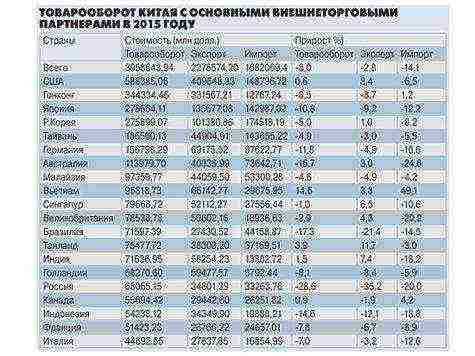
The secret of the success of workers from the Middle Kingdom
Looking at all this, you ask yourself a reasonable question: how is it that while our farmers complain about expensive loans, expensive rent, expensive seeds, expensive fertilizers, bad weather and low demand, the Chinese do not get tired of coming to us, no matter what? This is again about significantly higher performance. And this is far from just a matter of hard work. Continuous weeding alone will not help to harvest three crops per season, even in the Chelyabinsk region. The main secret is that they bring everything of their own: seeds of unpretentious hybrids, fertilizers and even film for greenhouses. All this happens most often by "gray" ways - without intermediaries, duties and other objective reasons for the high final price. All experiments with domestic seedlings did not lead to the desired result. And the result for the Chinese living in an acute shortage of land is crop yields. The taste and quality of the products are already secondary. This is a feature of national agriculture.
And to achieve this result, all methods are good. To do this, first of all, beyond any measure, fertilizers are used. Often this is ammonium nitrate and urea. For the uninitiated, it sounds especially creepy, but it must be explained that in our farms these substances are also used, but only at the initial stage, for feeding seedlings. Further use is not permitted. But this is not so bad. Worse, it is not known in which cases exactly which fertilizers are used. Nobody has even heard of product certification. You can, of course, take the vegetable to the laboratory for examination. But the first thing you will be greeted there is the question, what should you look for? The fact is that the specialists of the chemical and toxicological laboratory of the service for veterinary and phytosanitary supervision have only certain markers - and they are able to identify only 5-6 drugs permitted in Russia. All other growth stimulants remain a secret behind seven seals.
If everything is done according to the rules, then agronomists must calculate the pesticide load, draw up a plan for the introduction of drugs and then take the finished product to the laboratory to obtain a certificate. Long, difficult, expensive. It is not profitable. From the Chinese point of view, the more fertilizer, the better. But this does not mean that the workers in the greenhouses are deliberately insidiously trying to poison, more than twice the content of plant growth regulators in Krasnoyarsk vegetables. It's just that the mentality is different: if the fertilizer is released and it helps, then it is good. And if wholesalers also willingly buy, subsequently giving out Chinese tomatoes from Siberia and the Urals as the best from the Krasnodar Territory, this only confirms the quality of the fertilizer. According to their logic, if the fertilizer was bad, then it would not be released, and even more so the Chinese agronomists would not recommend it for abundant use. And the fact that then even weeds do not grow on the spoiled soil means that the earth has only become better, cleared of weeds.
Benefit for everyone except the consumer
With this approach, the prime cost, for example, of cucumbers is about 3 rubles, wholesalers buy at 6-10 rubles per 1 kg. They get to the markets and retail chains several times more expensive. With such prices, none of the typical problems of domestic agriculture, such as the lack of a sufficient number of vegetable stores, are terrible. In any case, everything will be sold out. And on top of that, these vegetables are sold not only to local markets, but also enter retail chains, despite the absence of any certificates. To do all this, a simple scheme is used: an individual entrepreneur comes to the base, negotiates with the Chinese, takes a batch of at least several hundred kilograms. Then he buys some really high-quality vegetables, perhaps even from a grandmother from a neighboring village, and goes with them for an examination as a producer. Naturally, such a clean vegetable will pass the test without any problems and receive a certificate. And with this certificate, the cunning businessman hands over the goods to the retail network. Simple and effective. The costs of obtaining a certificate and a possible agreement with a purchasing manager in a retail network are more than compensated for due to the multiple price difference.
Several harvests per season can smooth out the seasonal drop in vegetable prices. And for the sake of these few harvests, the Chinese begin to prepare greenhouses in February, heating them with simple wood-fired ovens. Everything is convenient, close at hand, but the nearest forests suffer from these "conveniences": trees are cut down for firewood and greenhouse frames, and instead of them the forest is filled with old greenhouse film, which spreads throughout the district. Sooner or later, the good land turns into a lifeless trash heap. In China itself, by the way, about 3 million hectares have fallen into disrepair due to the excessive use of pesticides. And the analysis of the state of the soil in the Krasnoyarsk Territory showed that the maximum permissible concentration of benzopyrene (a substance dangerous to the human body) in some samples was exceeded by almost 50 times. But the land is not its own - it's not a pity.
So historically and geographically, one of the largest clusters of Chinese agriculture was formed in Chelyabinsk. Officially, in the summer, about 4,000 people are employed in agriculture in the region, according to the PRC Consul in Yekaterinburg. About 2,000 Chinese work in the Novosibirsk Region, about 1,500 in the Krasnoyarsk Territory, and a thousand more in the Sverdlovsk and Omsk Regions. And according to the press service of the governor of the Chelyabinsk region, the South Urals is in one of the first places in Russia in terms of vegetable production by Chinese citizens.
In general, it is noteworthy that in Chelyabinsk the issue of Chinese farmers is not hushed up, but is presented as one of the main achievements of international cooperation. Officials even publicly praise the quality of Chinese products. It would be very interesting to find out by what criteria such assessments are given, because, for example, in the neighboring Sverdlovsk region, about 50% of vegetables on sale have excess in harmful substances - and almost all of these vegetables were grown in Chinese greenhouses.
According to the head of the organization for the protection of the labor and social rights of the Chinese in the Chelyabinsk region, Andrey Suzdolov, one greenhouse brings in about 6 million rubles a month in profit. However, this does not mean that Chinese farmers receive incredible super profits. Managers complain that they have to pay for everything: in order not to be kicked out to their homeland, you pay, so that the products are not taken for analysis, you pay, so that the greenhouses are not demolished by bulldozers, you pay. This is how most of the profits go. It is hard to believe that there is no corruption here. It would be naive to assume that no one knows about the huge greenhouse fields.
The Chinese leave, but only to return again
However, farmers also have objective problems of an exclusively economic nature. For example, the depreciation of the ruble.Managing enterprises selling products in Russia calculate the salaries of employees also in rubles. And if a few years ago six months of work in Russia made it possible to make savings and calmly return home with money, now everything is not so simple. Some workers say that if this trend continues, then next year there will be no point in coming to Russia - and this is said by the most unspoiled workers, even from the poorest northern regions of China.
In addition, in recent years, a trend has generally become noticeable for ousting illegal farmers. But this process is going differently in different regions. There are some sluggish movements in the Krasnoyarsk Territory. There, the court even ordered the owners of land plots to reclaim 282 hectares of land. But there is little sense in formal court decisions and bans on plant growing: often soon the same new greenhouses appear in the same "cleaned-up" place. But new quotas for the admission of Chinese workers are no longer issued (on the other hand, 1,433 already employed Chinese are not deported either). One of the most radical ways to solve the problem of illegal farmers was in the Krasnodar Territory: before the home Olympics, almost all Chinese were quietly “asked” to leave. Before the Olympics in the Krasnodar Territory, Chinese greenhouse complexes occupied about 15-16 thousand hectares. Now, in most cases, vacant lots are in their place. So, if you wish, this problem can be solved, you only need the will "from above", and, probably, a direct instruction for especially leisurely local officials.
But the danger is that new interested companies are coming to replace these farms. But, as a rule, these are not domestic farmers, but Chinese giant companies, ready to invest billions. According to the Food and Agriculture Organization of the United Nations (FAO), China is quite capable of feeding itself, but it will not be profitable. Food import for them is a deliberate and calculated way. It's cheaper this way. One of the most notorious cases is the lease of 115 thousand hectares in the Trans-Baikal Territory for a maximum period of 49 years by Zoje Resources Investment. The region will receive about 1.4 billion rubles for the entire lease term, which is about 250 rubles a year, and a promise to bring investments for another 250 million euros. Considering such a fantastically low rental price (our farmers never dreamed of such prices), there is no doubt that they are not the last tenants. Only two facts are alarming: Zoje Resources Investment is the daughter of the notorious Huae Xingban, which shamelessly exported timber instead of building a pulp and paper mill, and secondly, they are going to grow soybeans. With careless use of the land, this culture leaves behind almost a desert.
What's wrong with Russian farming
There are many examples of Chinese projects, because they do not care about Russian measures to support agriculture. Or their absence. Chinese capital allows agriculture to be developed almost anywhere. Domestic farmers, on the other hand, are faced with many problems that entrepreneurs from the Middle Kingdom do not have. Unlike the Chinese "black farmers", our farmers have no opportunity to force people to work 16 hours a day with minimum wages, slavery is now prohibited, and thank God! Option one - to resort to a technique that automatically pulls loans. But only a limited number of large enterprises have sufficient start-up capital. For example, a domestic harvester manufactured by Rostselmash costs about 5.2 million rubles, and even taking into account government subsidies, at least 3.6 million will be released - too much for an ordinary farmer to rely solely on his own funds.And here we are faced with the following problem: many banks, just hearing about agriculture, immediately refuse to issue a loan, considering such an enterprise too risky. And those that are ready to give money require at least 20% per annum. The determination of the farmers is already melting.
Therefore, our success stories, as a rule, begin with the fact that entrepreneurs had to sell a house and move to live in a utility room at a production site. The owner of the Russian Parmesan cheese dairy and the organizers of a farm in the Chelyabinsk region, which now cultivates only 1,000 hectares of wheat, have similar biographies. The only difference is that the cheese maker started working 20 years later. If in the mid-90s such an approach could still be justified, then in the 21st century it is wildness.
The only thing that stands apart in these ranks is the project of the Zhongji Shenge company to create a demonstration agricultural farm with an area of 10 thousand hectares. And an investment of 400 million euros. This project will be aimed at a more rational use of resources. Moreover, in China, imported products with an acceptable level of harmful substances are now gaining popularity. In the minds of many Chinese (at least those with incomes above the average), the notion that local vegetables cannot be of high quality has become entrenched, and not without reason. So Russian products, especially those grown by our farmers without pursuing record volumes, have every chance to occupy a very promising niche. Russia is also considered as the main supplier of feed for the world's largest farm Zhongding Dairy Farming, which is under construction for 100 thousand heads. This will require arable area of about 100 thousand hectares. And such plans should result in new investment projects, because in the last five-year development plan of China, it is fixed that it is necessary to buy shares of companies that export food to China.
There is an exit
But it is naive to hope that the Chinese will come and give our farmers money for development. It's just that no one will give anything to anyone. You need to develop on your own, but not reinventing the wheel, but learning where everything has been established for a long time. We are not the first to try to develop and support agriculture with civilized methods, and not with tons of chemicals. Earlier, the process of the formation of agriculture took place in Canada, which is in many ways similar to Russia in its climate and often difficult weather conditions. During the transition from state ownership to private, the industry faced problems, for many this type of business was unfamiliar. So, subsidizing farmers was then recognized as ineffective. It distorts the picture of risks in the long term, and the results achieved are short-term. For example, our subsidies for agricultural machinery: the manufacturer receives the subsidy for the discount provided, then the machinery goes to the dealers, who also make their own markup, much larger than before. In general, the assistance program of the Ministry of Agriculture is very confused, some support measures duplicate each other, some contradict each other. As a result, about 25% of the money allocated to support agriculture remains completely unused.
Canada, which ranks third in the world in terms of agricultural exports, quickly abandoned the dominant role of subsidies and moved on to creating favorable conditions for doing business and targeted support. The main priorities now are long-term industry planning, price regulation and demand support. And this is logical: if there is a stable demand, it means that the farmers will have a stable income, and what equipment is better to buy - they will figure it out themselves. On the other hand, programs to protect agricultural production in the medium term are being actively developed and implemented,programs for adapting strategies and technologies to real industries with a detailed risk assessment, compensation for the costs of processing enterprises to control the quality of raw materials is underway, programs for restructuring farmers' debts are being implemented, R&D funding is underway, which allows for breeding work (and hardy plants, by the way, are one of our trump cards Chinese), special autumn interest-free loans are being introduced, allowing farmers to postpone the sale of products in order to avoid market filling and a collapse in product prices.
Sooner or later, the period of spontaneous greenhouses will pass. From them a lot of harm to the environment, and vegetables, objectively speaking, do not understand what taste. However, for all its shortcomings, the Chinese presence on our lands did one important thing: they showed us that it is possible to grow vegetables even where practically no one tried to grow anything on an industrial scale before. Naturally, the current barbaric approach is unacceptable. There is no need for it - after all, there are already well-proven measures, they are applied on an ongoing basis and made agriculture one of Canada's greatest strengths.
It's time for us to pay attention not to the allocation and redistribution of money supply to endless incomprehensible construction projects, purchases and other difficult-to-track routes, but to focus on ensuring demand for high-quality products. The volumes of the Chinese cannot be overcome; in this regard, their methods are unrivaled. But it is also true that the overwhelming majority of Chinese products cannot compete with domestic ones in quality. High quality and demand are the anchor principles for the successful development of agriculture in Russia.
Chinese vegetable growers continue to develop the Ural lands. Moreover, they do it under the Russian "guise" - in order not to pay taxes as foreign entrepreneurs, but on the contrary - to receive benefits. Villagers who have worked for foreign farmers say that 3 harvests per season are not so much the result of hard work, but rather “the fruits of the chemical revolution”. In such a regime, it is not possible to farm in the same place for a long time, and therefore Chinese agricultural producers wander around the Ural lands, setting up their greenhouses and growing their economy in new territories. There are hundreds of such greenhouses in the Beloyarsk District alone. The townspeople who buy such rural products hardly know how the "celestial cucumbers" were grown.
The Sverdlovsk region was chosen by the Chinese as an agricultural territory several years ago. The controversial climate of foreign agricultural producers did not bother - in their homeland it is the same. In the Beloyarsk District, greenhouses of Chinese vegetable growers appeared about 3 years ago. Then the arrival of foreigners to the Ural lands was actively boasted by the Minister of Agriculture Sergei Chemezov. A year later, the first scandal broke out - in the Alapaevsky district.
To read, open the tab
The Russian Prosecutor General's Office investigated the illegal activities of Hong Li LLC, whose employees grew vegetables. During the inspection, the inspectors found products containing an unacceptably high amount of deltamethrin (a substance very dangerous to human life and health, capable of causing dysfunctions of the nervous system), exceeding the established norms by 4.4 times. The inspections also examined the land in greenhouses where the Chinese were growing cucumbers and tomatoes.
Examinations have shown that the soil is saturated with harmful substances that cause serious human poisoning, up to and including death. At the same time, the workers of Hong Li LLC actively used hexachlorocyclohexane, the use of which was generally prohibited on the territory of Russia. At the same time, it was announced that there are 11 such enterprises in the region, each of which employs about 100 Chinese citizens.In addition to the Makhnevsky region, firms operate in the Beloyarsky, Tugulymsky regions, as well as in Rare, which in total occupy several hundred hectares of land. "
There are greenhouses in the Beloyarsk District even now. They number in the hundreds. Correspondents of the "New Region" visited an agricultural enterprise in the village of Khramtsovo and studied how the Chinese live and work. As local residents say, when the local state farm finally collapsed, its owner, Sergei Ivanov, bought shares from his subordinates and sold them to Vladimir Gaffner. Who leased the land to Asian visitors. Legally, these lands were leased for seven years to the company "Golden Fields" LLC.
Everything is as it should be for a small business aimed at reviving Russian agriculture. Tax incentives and other economic benefits promised by our government. Representatives of the company with undisguised pleasure presented evidence that the company was admitted to the register of agro-industrialists of the Sverdlovsk region. That is, Chinese vegetable growers do not pay taxes for foreign companies.
Although they could - after all, they collect, according to the local population, three harvests a year. Villagers also work in Chinese greenhouses - everyone needs jobs. And the grown products are unlikely to be eaten by themselves, preferring cucumbers from their own garden, because they see the amount of chemicals with which super-results are achieved. As mentioned above, in addition to the release of unsafe products, damage is also inflicted on the Ural land.
Citizens of the PRC after a couple of years liberate the land, moving to new sites. But on the territories they left, nothing grows.

